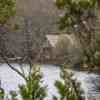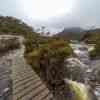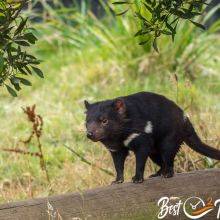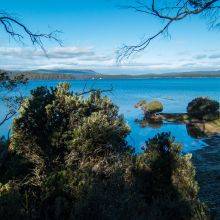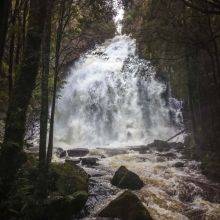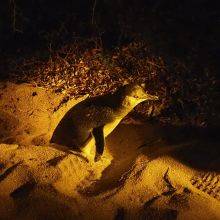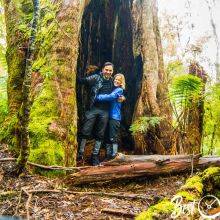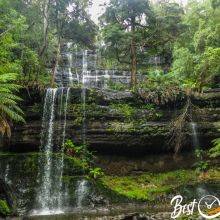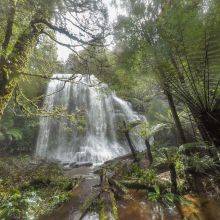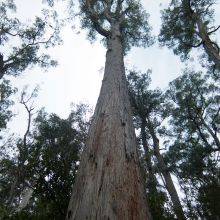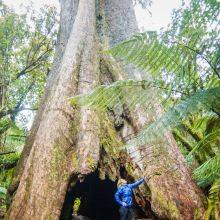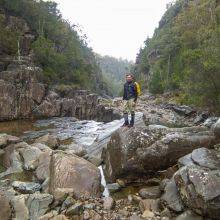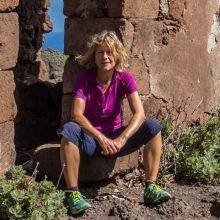When Is the Best Time
Hiking in the Cradle Mountain National Park is very popular throughout the year. However, you have to deal with snow in the winter, and despite more pleasant temperatures in the summer, the weather is even more unpredictable. Due to the park's high elevation of almost 1000 m elevation, snow can also occur in December, as it happened in 2019, Mid-November 2021 and late November 2022.
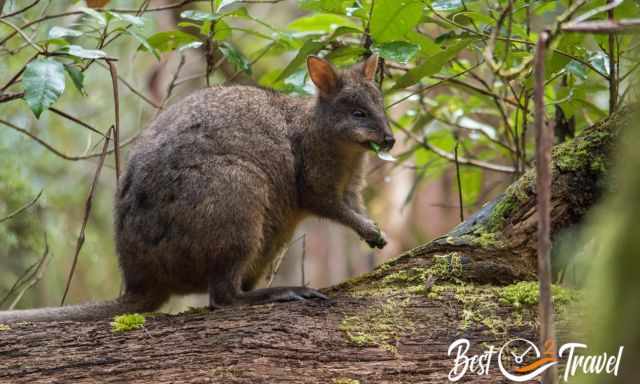
Cradle is pretty busy, with the highest accommodation rates and crowds around Dove Lake during the summer. Do you wish to explore Cradle on one of the existing hiking trails? You will find my Table of Content, descriptions, detailed Locus App Maps, and all about the Cradle wildlife below.
Weather by Seasons
The best time to visit Cradle Mountain is from December to March. January and February experience the least amount of rainfall. The winter is the quietest time and the coldest, which makes hiking to the summit in snow and ice sometimes impossible.

These months with the most stable weather are also the busiest. There was a new visitor record in 2021. Visitor numbers are increasing annually; November and April are less crowded. Keep in mind; that the weather at Cradle is notorious for its unpredictability throughout the year. Always check the weather forecast before hiking. In November 2021, there were three rescues in three days due to the poor weather. In late November 2022, Cradle experienced heavy snowfall like in winter. Weather Forecast Two forecasts are available: one for Dove Lake and one for Cradle Mountain at 1545 m elevation.
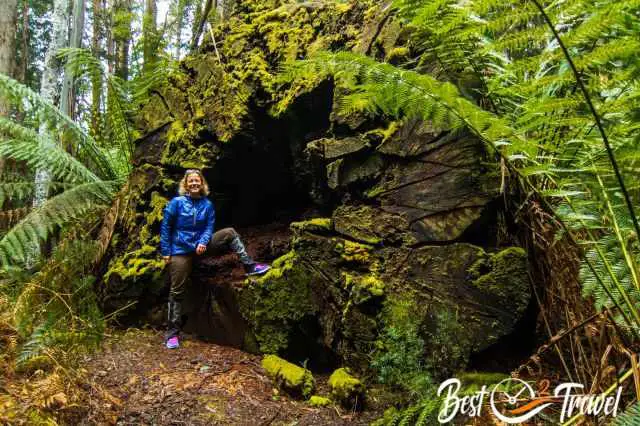
Shuttle Bus Service and Parking - New Shuttle Bus Ticket Summer 2023/24
I couldn't believe the news for Cradle Mountain. A fee of $15 will be introduced for using the shuttle bus from November 15 onwards. The ticket is valid for three days; an annual ticket is $45. You can get the ticket at the Cradle Mountain information centre.
There is one car park at Dove Lake and one at Ronny Creek. Arriving early is recommended in summer before 8 a.m. and in winter before 8.30 a.m. because of the restricted access. Otherwise, shuttle buses have to be taken. For National Park Pass holders, the shuttle bus is free. Due to the increasing number of visitors, a new bus service also for people with disabilities was introduced in 2018. When these medium-sized buses operate, cars can't get to the parking. You must drive behind the bus if you wish to leave the parking with your vehicle during operating hours. If you want to hike independently, consider the bus operating hours. Dove Lake car park capacity of roughly 230 cars - e-car charging available. Now, only cars are allowed, now campervans, caravans, and other more oversized vehicles.
Shuttle Bus Operating Hours
The shuttle goes every ten minutes, however, during crazy summer days, you may line up.
- Summer 8 am - 7.30 pm
- Winter 8.30 am - 4.30 pm
Bus Stops
- Visitor Centre
- Interpretation Center and Ranger Station
- Snake Hill
- Ronny Creek
- Dove Lake
New Viewing Shelter at Dove Lake
A new viewing shelter was built at Dove Lake, and Cumulus Studio won two prestigious awards. This new modern building includes a hiker registration, an information area, toilets, and a bus shelter. However, who needs a viewing shelter in the rain? If it rains, Cradle is covered in clouds. To experience this incredible National Park's natural beauty, you must hike despite the weather. I talked to several residents, and most don't understand the need for an "ugly box" or "a shelter without a character which does not suit the climate". Let me know what you think about it
Is It Worth Going to Cradle Mountain?
If you haven't been to Cradle Mountain, you haven't been to Tassie. Experience the pristine wild nature, the alpine landscape, and the fascinating rainforest with abundant wildlife. Even if you only spend a week in Tasmania, this is the Must-Visit National Park. It is an exceptional place to escape it all and has majestic beauty in all seasons.
Can You Do Cradle Mountain in One Day?
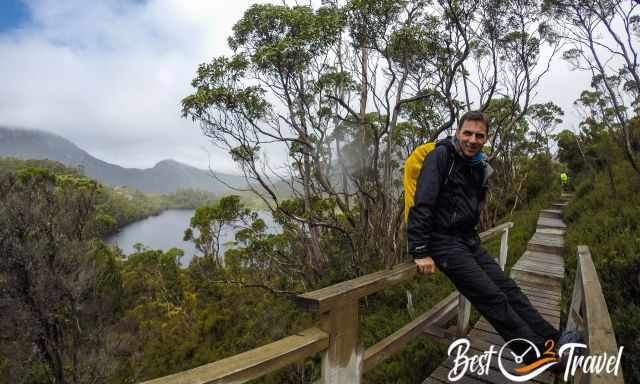
Honestly, rushing to Cradle to spend less than one day, in the end, doesn't make sense. If you just wish to see Cradle and Dove Lake and hike around the lake, that is possible in one day. Nevertheless, this is Cradle, notorious for clouds and rainy weather. If you spend just one day here, you cannot count on seeing Cradle Mountain. Due to the remote location, I always recommend at least two nights to be a bit safer to go on a hike to experience this exceptional nature mother earth created here.
Spring (October-November)
Wildflowers are abundant during spring and early summer. Tasmanian Waratah and Banksia are flowering, which is beautiful to see. Echidnas can be seen getting active after hibernation in winter. Day temps range between 10°C-15°C / 50°F-59°F on average. October is one of the windiest months of the year. We experienced snow and hail in November on a higher elevation with 0°C / 32°F while hiking. Also, in 2021 and 2022, it snowed in Cradle until mid-November.
Summer (December-March)
More stable weather from December to April with warmer daily temps on average around 15°C-18°C/59°F-64°F. The "warmest" months are January and February, and less precipitation from January to March. However, the weather is unpredictable. Be prepared for four seasons in one day, even during summer.
If you wish to camp, be prepared for one-digit night temps throughout the year. Even during summer, expect snow as well. If hiking the Overland Track, carry warm clothes as well. In December 2019, three hikers suffered hypothermia, and luckily, all of them got rescued.
Autumn (April - May)
You see a spectacular range of autumn colours in April and May, from gold to deep red. The deciduous beech tree, also called Fagus, is the icing on the cake until it loses its leaves. The tree is endemic to Australia. Daily temps are around 10°C-15°C / 50°F-59°F on average. Nights are cold, ranging from 5°C-3°C / 41°F-37°F, with already increasing rainfall in April. The autumn in 2020 was wet and freezing already, with snowfall at the end of May.
Winter (June-September)

The winter is the wettest time of the year, which means the snow season in Cradle. Snow is expected, usually from July to September, with an average daily temp of 6°C / 43°F. It can get even colder and freezing at night (below 0°C / 32°F). Be prepared for minus degrees at night while camping. The coldest months are July and August.
Hiking can be difficult and strenuous, depending on the amount of snow. If there is heavy snowfall, the road to Dove Lake is closed for 2WD. May and September are a little warmer. However, it is not uncommon to experience snow at Dove Lake and higher elevations in these months.
Top Tip for Cradle Mountain Hiking: Check the weather forecast and conditions before you venture into the National Park. Check out the Weather Link or stop by the visitor centre.
Avoiding Crowds

Cradle is the second most visited National Park in Tassie, attracting more than 300,000 people each year and increasing visitor numbers annually. You almost don't experience any crowds in the low season during winter. During summer, it's busy with visitors worldwide, especially at Dove Lake. Longer and more strenuous hikes are less trafficked. To get a memorable experience, visit the park early in the morning, and it gets less busy again in the late afternoon. The crowdiest months are from December to March nowadays. November and April are still busy but bearable.
Top Tip for the Peak Season: Start your hike before dawn with headlights and enjoy a breathtaking sunrise from Marians Lookout.
Hikes and Wildlife Guide can be found below.
Packing List - 8 Tips for Cradle

Good preparation is key for the Cradle Mountain National Park, not only in the winter.
- Clothes that you can layer on.
- A rainproof jacket - softshell throughout the year.
- Gloves and a woollen hat even in summer for hikes in higher elevations.
- Hiking Boots and gaiters; gaiters protect you from the scrub. We bought them in the Cradle Mountain visitor centre.
- Hiking Poles (depending on the trails you like to do).
- Plenty of water and electrolytes, plan at least three litres for a day hike in the summer.
- Crampons during winter for hiking in higher elevations.
- A waterproof camera is the best option - showers and rain occur throughout the year.
Top Tours for Cradle Mountain and TassieThese are my recommended tours via GetYourGuide. Thx for booking via my website! With your support, I am able to provide all information first-hand. Tour prices are at no extra cost!
Where to Stay (Hotels | Lodging Tips)The iconic Cradle Mountain National Park, with its glaciated landscape, 25 peaks, tarns, exceptional flora and fauna, waterfalls, and hikes, attracts more and more visitors worldwide. The park is spectacular at any time of the year. Usually, visitors stay here for one or two nights which is too short, IMO. I recommend staying at least three nights if you have a day to spare. There are different accommodation types and price categories around Cradle Mountain. Book your accommodation and self-catering cottage well in advance, otherwise, expect a much higher rate on the day of arrival.
 Camping is possible around Cradle Mountain. Powered and unpowered campsites are available at Discovery Parks. Nevertheless, remember that rain and snow are common, and nights are often pretty chilly and uncomfortable; one-digit night temps throughout the year and even minus in the winter. |
Best Months to Visit
Location and Tips

Cradle Mountain and Lake St Clair National Park were established in 1971. Part of the Tasmanian Wilderness World Heritage Area since 1982. In 1922 it was a Scenic Reserve only. It is estimated that millions of native King Billy pines were felled until the 70s. Logging was and still is a threat to the old grown forests in Tasmania.

We spent several days at Cradle Mountain National Park in February and a year later in November, and none was very sunny. We experienced different seasons in one day except for snow in February. Due to the untamed weather, Cradle Mountain was always covered in clouds four seasons in five days.
Are you looking for stunning Cradle Mountain hiking trails from easy to strenuous? You've come to the right place. Below you can find 5 amazing trails: three at Dove Lake, which you can do from Ronny Creek and one at the Interpretation Centre, plus the famous Overland Track. For a quick overview, check out my Table of Content:
5 Amazing Walks & Hikes
Hiking in Cradle Mountain National Park is a must in all kinds of weather. We visited the park already twice, and despite the weather - snow and hail during our second visit - we would immediately love to explore one of the tracks again.
Dove Lake Car Park and Trail Head
Situated at an altitude of 940 m and nestled amongst the mountain peaks. Many hiking trails with all kinds of difficulties and fitness levels start from here, and trails are well marked. Alternatively, you can also begin the hikes from Ronny Creek at 870 m elevation. A shuttle bus leads to the Dove Lake car park as well. Parking and trailhead (Google Maps)
1 Dove Lake Circuit Walk
6 km | 2 hours | 254 m elevation gain | Locus Pro Hiking Trail Map
It's a beautiful and fairly easy hike with awesome scenery around the pristine Dove Lake. You can walk this trail throughout the year in all types of weather. The trail is more frequented. However, most visitors walk to Glacier Rock (10min) or the popular boatshed only. The well-maintained and mostly flat path leads over many boardwalks and some steps. Even if you only do the Dove Lake Track, it's worth the drive to come here.
2 Crater Lake Circuit Walk
12.0 km | 4-5 hours | 647 m elevation gain | Locus Pro Hiking Map
This is a wonderful trail to experience the beauty of Cradle in one day. The alpine lakes track can also be hiked in poor weather conditions. The landscape and vegetation are definitely otherworldly. This is how we combined the different trail sections into one outstanding track. The first part of the circular hike to Lake Lilla, Wombat Pool, and the viewpoint close to Wombat Peak is also the way back to the car park. The trail forks here, and you can either return or continue and circle Crater Lake.
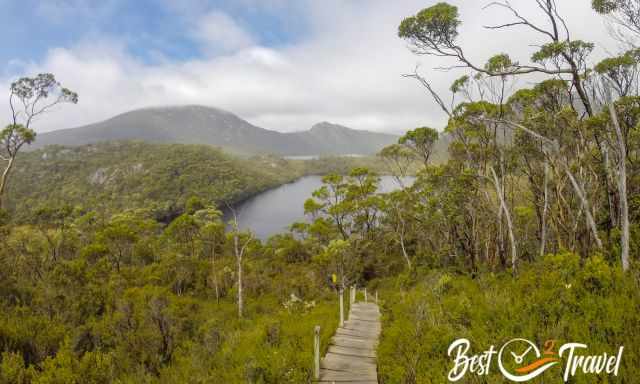
It’s a very picturesque place, and we took a short photo stop. Now turn right and ascend this track until you reach Crater Peak at 1.270 m elevation. Now, it is a gentle walk in higher elevation to Marion's Lookout offering breathtaking views. Now the trail descends, leading back to where the trail forked. We took a short break on the bench at Wombat Pool, and we were still in awe of this unique landscape. It’s a short detour of 400 m return to get to the picturesque boatshed of Dove Lake, the most famous picture of all. The hike can be done in either direction throughout the year.
3 Cradle Mountain Summit Hike
13 km | 7-8 hours | 873 m elevation gain | Locus Pro Map
Update: In May 2022 an upgrade for this track was finished with an installation of an 80 m timber boardwalk to protect the adjacent plants. Please stay on the trail and minimize your impact on this vulnerable environment.
This hike is the best alternative if you don’t hike the entire Overland Track to get a glimpse into the most beautiful National Park of it all. It is one of the 60 Great Short Walks of Tasmania. It’s a pretty strenuous trail due to the length and the climb to the summit. It’s only for experienced hikers without any fear of heights. Know your limits. You can walk the trail in either direction. The added Locus Pro map is how I recommend hiking the trail to explore as much as possible. First, sign in to the logbook. Then hike the narrow path to Lake Lilla, Wombat Pool, and continue to Marions Lookout at 1223 m elevation.
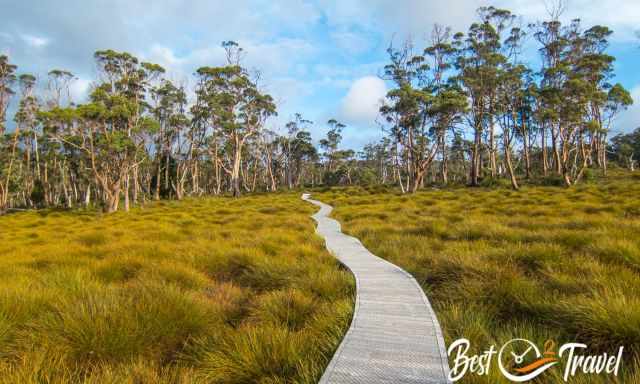
This part takes roughly 1.5 hours. Enjoy the spectacular view of Crater Lake and Dove Lake. Now continue on the Overland Track to Kitchen Hut (1230 m), an emergency hut for overnight. To get here, add max. one hour. Most hikers leave their heavy backpacks in the shed before climbing the steep trail over boulders to the summit on 1545 m elevations. It’s frequently very windy on top but the 360° views are phenomenal. The return hike from the hut to the Cradle Mountain summit takes two to three hours. You can either choose the Face Track via Hansons Peak or Lake Wilks to the Dove Lake Circuit to get back to the car park. The way back takes roughly 2.5 hours. Take a slow pace and enjoy the spectacular scenery and nature. Don't forget to sign out.
Ronny Creek Car Park and Trailhead
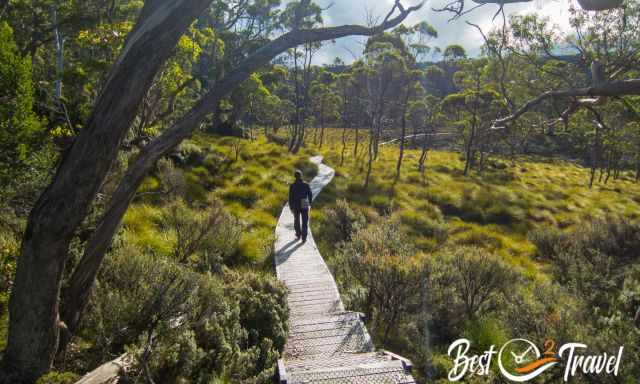
The Overland Track starts from here, and also Lake Lilla and Ronny Creek are an alternative for the Dove Lake car park. If you start from Ronny, the hikes will take additional 40 minutes, depending on your pace. Wombats can be spotted here pretty often. Parking and Trailhead (Google Maps)
4 Overland Track
65 km | 6 days | Permit
Around 8.000 people walk the Overland Track each year. Due to the weather, the most famous season is from 1. October to 31. May. Hikers are required to walk from north to south. Booking in advance is essential for peak season. The fee for adults is 200 $ plus the National Park Pass fee. From 1. June to 30. September advanced booking isn’t required.
You can hike in either direction, and you have to pay the National Park fee only. Nevertheless, hiking in winter is recommended for experienced alpine hikers only. Expect heavy snow. Snowshoes and crampons are needed. More information and booking Overland Track
Interpretation Centre Car Park and Trailhead
This is not the information centre; it is located two km before with huge parking. The Interpretation Centre has fauna and flora displays, and it's the ranger station as well. Some Cradle walks start here; the short Enchanted trail to an old-growth rainforest, King Billy Walk, Pencil Pine Falls Rainforest Walk, and the more challenging Dove Canyon Track.Parking and Trailhead (Google Maps)
5 Enchanted Walk
King Billy Track - Dove Canyon Track - 7 km | 3.5 hours | 264 m elevation gain | Locus Pro Trail Map
This is a combination of two tracks and a wonderful half-day hike. It's an exceptional track that leads through a mystic myrtle beech forest, old King Billy Pines, along the Pencil Pine Falls, and Knyvet Falls with steep and rough rock scrambling back to the Cradle Valley Boardwalk. The Tasmanian Pencil Pine is slow growing like most alpine plants. These amazing trees can get a thousand years old.
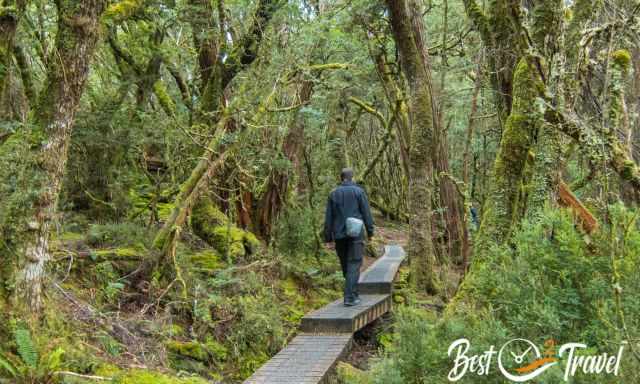
At this trail, hiking pools are not recommended. The path is too narrow, the boardwalk easy to hike, and hiking pools are obstructive for climbing up the boulders. If you have a day to spare and you want to escape the crowds, this is your hike. Often you can find wombats and pademelons around the Interpretation Center and close to the boardwalk. Watch the path carefully in the forests; many roots are along the track.
Cradle Mountain Wildlife Guide
Cradle Mountain National Park is heaven for wildlife watching. These are the different species you may spot. Most of them are used to humans and let you watch them if you don't get too close.
Wombats
They are crepuscular and nocturnal. The best chance for a sighting is at dusk and dawn. They also venture out to feed on cool and overcast days in open patches of grassland. The famous Cradle Mountain National Park is crowded with day visitors, and wombats are hiding. In the late afternoon, when the crowds thin out, it becomes quiet and peaceful, and you may spot several wombats near the Interpretation Center, Waldheim Lodge, and Cabins. Some lazy wombats use the boardwalks to move forward. We frequently spotted them at the mentioned places but also on our hikes.
Can you imagine these cute guys are fast runners if they must evade predators? They can speed up to 40 km/h. They have poor eyesight; instead, they hear extremely well. Wombats, pademelons, and wallabies are abundant in this park. Three different species of wombats exist. They are about one meter long and dig huge burrow systems with claws and front teeth. Attacks on people with teeth and claws can happen.
Wallabies and Pademelons
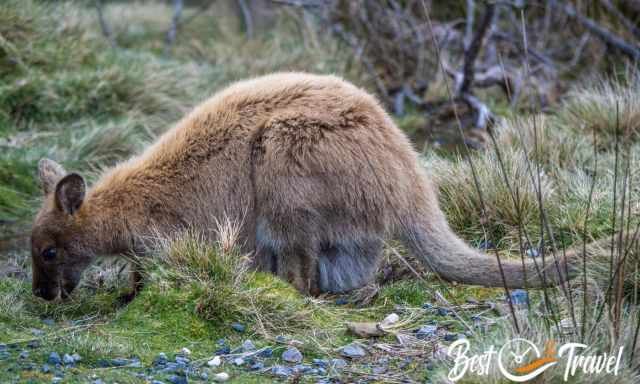
They can be spotted late afternoon and evening, especially near Waldheim Lodge and Cabins. Different species of wallabies can be found everywhere in Tassie and so at Cradle Mountain. Kangaroos, wallabies, and pademelons are marsupials, all members of the same family and are often named after their habitat, like the brush wallaby, the shrub wallaby, and the rock wallaby.
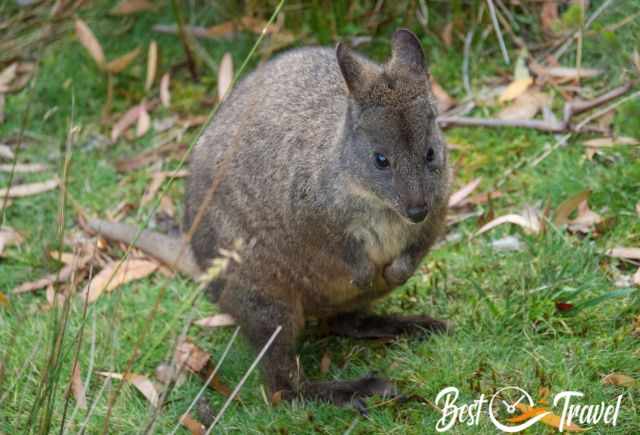
Pademelons are also frequently seen around self-catering cottages. Pademelons are shy, rarely leaving the forest or bush. Their round ears give a mouse-like looking. They have a short lifespan of 4-8 years in the wild. They have adapted to the dense rainforests where they find their food, like leaves, mosses, lichens, and ferns. They are much smaller, having shorter and thicker tails. These are solitary creatures not living in groups.
Echidnas
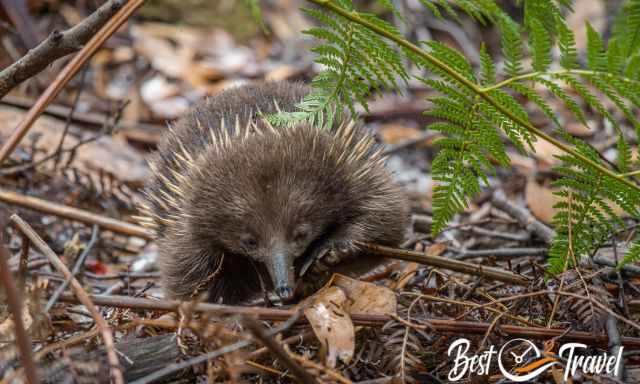
They are active until the end of summer (March/April) before hibernating again until late October to mid-November.
Tasmanian Devils
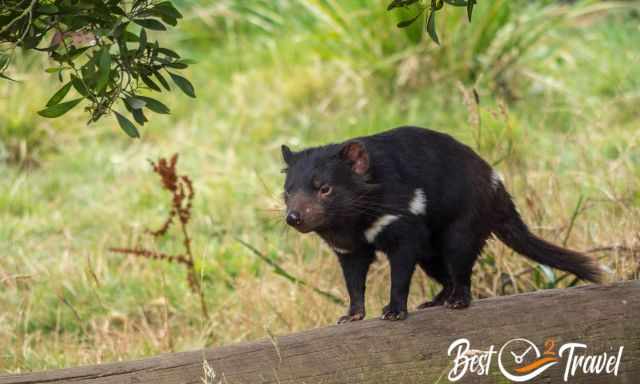
Possible to spot but rare. Unfortunately, cases of devil facial tumour disease have been reported recently. Trowunna, close to Cradle Mountain, is an excellent Wildlife Park to see the devils relatively close.
Possums
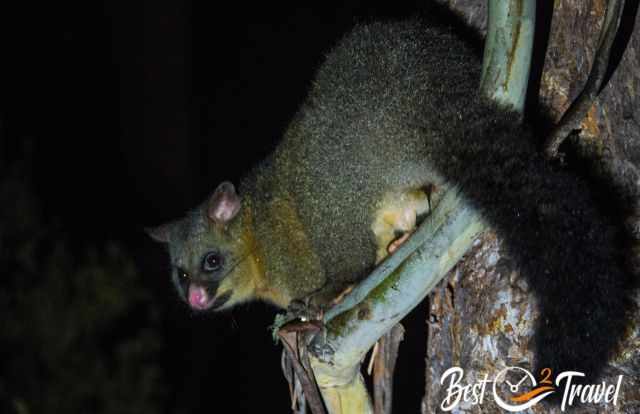
Possums are night-active and frequently seen near garbage bins and around the cottages.
Platypus
They are extremely difficult to spot, coming out when it's almost dark. We haven't seen any yet.
I frequently get asked if there are snakes in Cradle. Yes, snakes are common in Australia and also in Tasmania. Snakes are most active in the warm summer. I saw several venomous snakes in Tasmania during our four-week vacation.
Do you want to obtain the usage right for my images? Contact me, but I will take action against picture theft.





















